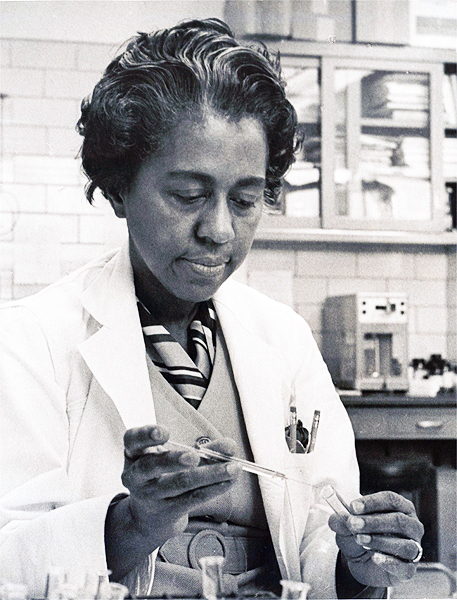By Chuck Sanders

As part of my responsibilities as president of The Protein Society I recently had the pleasure of announcing a new society award: the Marie Maynard Daly Award. Daly was a trailblazer as the first Black woman in the United States to receive a Ph.D. in chemistry (from Columbia University); she also actively promoted diversification in STEM. The Marie Maynard Daly Award will be the society’s eight annual award and will recognize groundbreaking research at the interface between protein science and human health.
Raised in Queens, New York, Daly seems to have been turned on to science by her father, a postman who had to quit his undergraduate studies in chemistry at Cornell University due to a lack of financial resources; reading Microbe Hunters as a girl also particularly inspired her. After attending Hunter College High School, she graduated from Queens College with a degree in chemistry. Just a year later, she received a master of science degree from New York University, which led to a crisply successful three-year Ph.D. stint in chemistry at Columbia University. There, she studied amylase biochemistry under the direction of Mary L. Caldwell and defended her dissertation in 1947.
Daly then taught for two years at Howard University before returning to New York City to conduct postdoctoral studies under the direction of Alfred Mirsky at the Rockefeller Institute, where she published 10 papers, most as first author, including three remarkable papers. The first, “Synthesis of protein in the pancreas. The role of ribonucleoprotein in protein synthesis,” (Allfrey, Daly, and Mirsky, J Gen Physiol, 1953. DOI: 10.1085/jgp.37.2.157) proved that an intact protein/RNA complex is absolutely required for protein synthesis. The other two, “The amino acid composition and some properties of histones” (Daly, Mirsky, and Ris, J Gen Physiol, 1951. DOI: 10.1085/jgp.34.4.439) and “Histones with high lysine content” (Daly and Mirsky, J Gen Physiol. 1955. DOI: 10.1085/jgp.38.3.405), represent painstaking protein chemical characterization that included early recognition of the prominence of basic amino acids in histone structure and function.
While the historical record is incomplete (for an interesting article on how hard it is to find biographical information on Daly, see a 2022 Science News article by Megan Scudellari), Daly then spent five years at Columbia University, possibly as an instructor, until she took a faculty position in biochemistry at the Albert Einstein College of Medicine and reached the rank of tenured associate professor before retiring in 1986. During her time at Columbia and persisting through the end of her career, Daly shifted her research focus toward molecular risk factors for complex human disorders. Very notably, she contributed to early studies of the relationship of high cholesterol to hypertension and atherosclerosis (see “Cholesterol concentration and cholesterol synthesis in aortas of rats with rental hypertension,” Daly et al., J Clin Invest 1963. DOI: 10.1172/JCI104845). Perusal of her independent papers shows she was able to secure considerable extramural funding and that she was also holder of an American Heart Association Established Investigator fellowship.
Daly also was active in promoting equity in the scientific community. This included her participation in a small AAAS-sponsored conference of 30 minority female scientists in 1975 that led to the publication of a groundbreaking report, The Double Bind: The Price of Being a Minority Woman in Science. She also actively mentored underrepresented scientists, promoted their recruitment to Albert Einstein College, and established a scholarship fund for Black scientists at Queens College.
Daly passed away due to cancer in 2003 at the age of 82.
Let me close by making a personal recommendation. If you have not already seen it, treat yourself by watching the astounding documentary movie (and 2022 Oscar winner) Summer of Soul, directed by Ahmir “Questlove” Thompson, which is about the once nearly-forgotten 1969 Harlem Cultural Festival. Maybe Daly, who was known to love (and play) music, took a break from her lab to attend this historic event? We likely will never know, but I hope you will tip a glass in Daly’s honor as you watch it.
Sources and acknowledgements
Primary research literature. Medical News Today, Mayo Clinic, Science News, and New Scientist. I thank Raluca Cadar (The Protein Society), Bil Clemons (California Institute of Technology), Emily Hodges (Vanderbilt University), and Anthony Forster (Uppsala University) for edits and helpful comments. I also want to thank the DEI Committee of the Protein Society for recommending we create this award (Bil Clemons [chair], Sheila Jaswal, Heather Pinkett, Carla Mattos, and Jeanne Hardy).